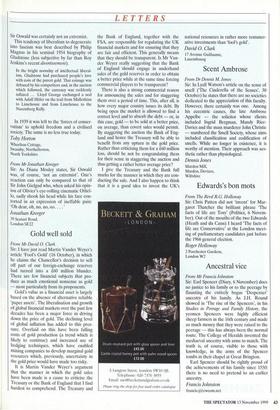Gold well sold
From Mr David 0. Clark
Sir: I have just read Martin Vander Weyer's article 'Fool's Gold' (16 October), in which he claims the Chancellor's decision to sell off part of our foreign-exchange reserves had turned into a £60 million blunder. There are few financial subjects that pro- duce as much emotional nonsense as gold — most particularly from its proponents.
Gold's value as a financial asset is largely based on the absence of alternative reliable 'paper assets'. The liberalisation and growth of global financial markets over the past few decades has been a major force in driving down the price of gold. The declining level of global inflation has added to this pres- sure. Overlaid on this have been falling costs of gold production (a trend which is likely to continue) and increased use of hedging techniques, which have enabled mining companies to develop marginal gold resources which, previously, uncertainty in the gold price would have made too risky.
It is Martin Vander Weyer's argument that the manner in which the gold sales have been made is a cause to criticise the Treasury or the Bank of England that I find hardest to comprehend. The Treasury and the Bank of England, together with the FSA, are responsible for regulating the UK financial markets and for ensuring that they are fair and efficient. This generally means that they should be transparent. Is Mr Van- der Weyer really suggesting that the Bank of England should engage in underhand sales of the gold reserves in order to obtain a better price while at the same time forcing commercial players to be transparent?
There is also a strong commercial reason for announcing the sales and for staggering them over a period of time. This, after all, is how every major country issues its debt. By being open the market is allowed to find a correct level and 'to absorb the debt — or, in this case, gold — to be sold at a better price, on average, than covert sales would permit. By staggering the auction the Bank of Eng- land and hence the Treasury will be able to benefit from any upturn in the gold price. Rather than criticising them for a £60 million loss, should he not be congratulating them for their sense in staggering the auction and thus getting a rather better average price?
I give the Treasury and the Bank full marks for the manner in which they are con- ducting the sale. And I also happen to think that it is a good idea to invest the UK's national resources in rather more remuner- ative investments than 'fool's gold'. David 0. Clark
17 Avenue Guillaume, Luxembourg


























































































 Previous page
Previous page